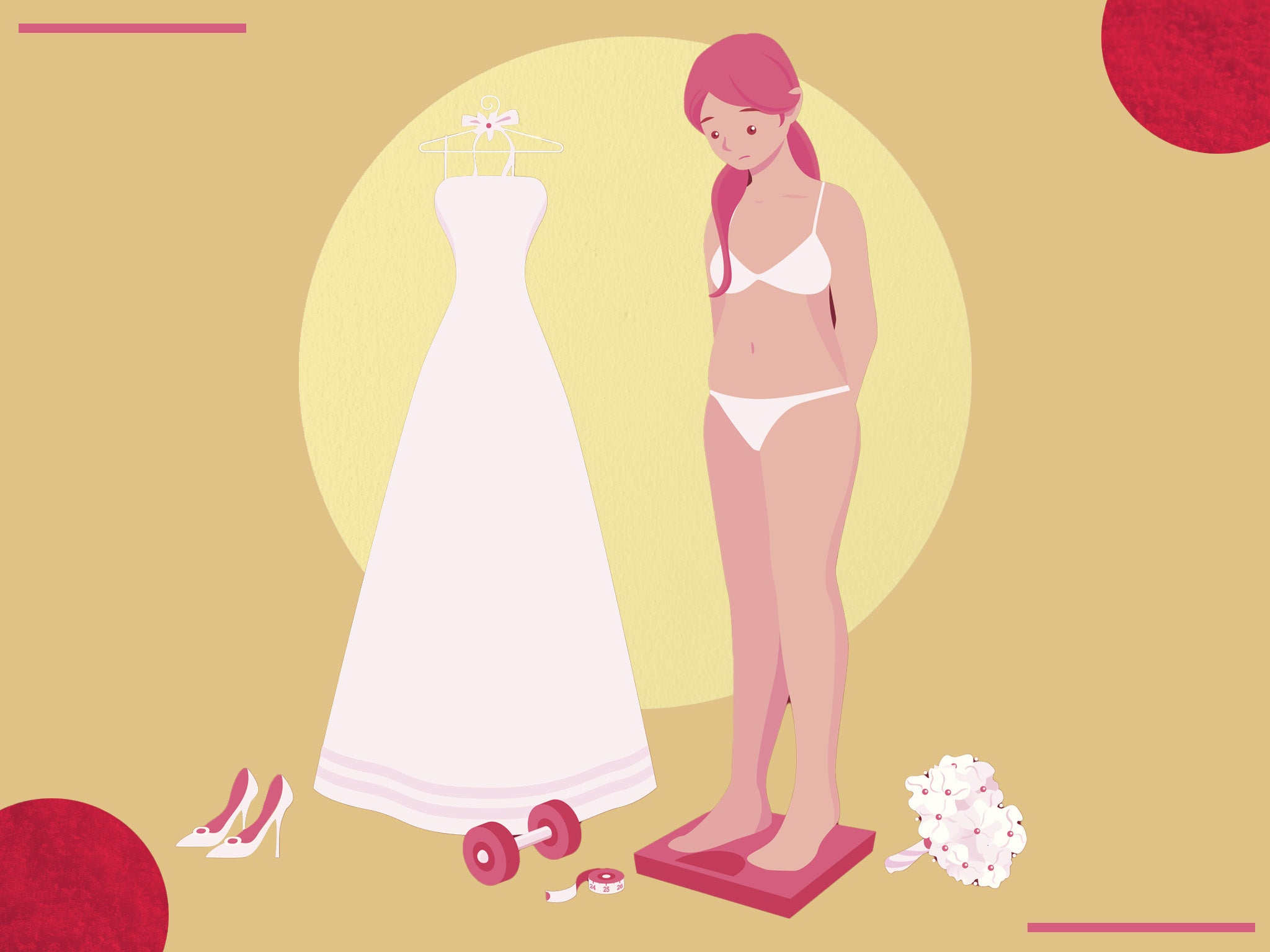I thought I was beyond wedding day weight loss pressure. So why am I fixated on it?
With her big day just weeks away, Joanna Whitehead is feeling the pressure to drop the pounds


Your support helps us to tell the story
From reproductive rights to climate change to Big Tech, The Independent is on the ground when the story is developing. Whether it's investigating the financials of Elon Musk's pro-Trump PAC or producing our latest documentary, 'The A Word', which shines a light on the American women fighting for reproductive rights, we know how important it is to parse out the facts from the messaging.
At such a critical moment in US history, we need reporters on the ground. Your donation allows us to keep sending journalists to speak to both sides of the story.
The Independent is trusted by Americans across the entire political spectrum. And unlike many other quality news outlets, we choose not to lock Americans out of our reporting and analysis with paywalls. We believe quality journalism should be available to everyone, paid for by those who can afford it.
Your support makes all the difference.It’s four weeks until my wedding day and I’m in floods of tears. In addition to feeling utterly exhausted and stressed out by the endless logistics, spiralling costs, and the pressure for everyone else to have a good time, I’m feeling bad because I haven’t lost the weight I wanted for my big day.
It’s a Saturday morning, so I should be relaxed, but my mind starts racing from the moment I wake up. I contemplate crafting a restrictive meal plan to ensure I don’t add any additional pounds in the days leading up to my wedding. My previous goal to remain sober for the month prior to my nuptials has already been broken after having a much needed pint after a busy week. I feel gutted after consulting my period tracker and discovering I’ll be at my heaviest when I’m walking down the aisle.
Is this what love is supposed to look like?
The pressure to be a perfect bride is rife across most cultures, with much of this relating to appearance. Brides — much like pregnant people and new mothers — are subject to intense scrutiny, with everyone feeling entitled to an opinion on what they look like, their dress, their diet and, of course, their size. Much has been made of the Bridezilla trope — a deeply misogynistic archetype, in which women who are seen as “too” obsessive about their big day are compared with a mutated monster. I often wonder if these women are simply people at the end of their tether. Women heavy with the weight of other people’s expectations. Terrified of their judgements.
A desire to lose weight ahead of a wedding is extremely common. A 2008 study by Cornell University found that 70 per cent of women surveyed wanted to lose weight ahead of their special day. And a 2019 study found that while 62 per cent of brides wanted to drop the pounds before they say “I do”, only 18 per cent managed to achieve this.
I’ve swapped sleep-ins for swimming sessions, happy hour for HIIT class, and a social life for squat jumps
Anxiety about my own bridal body has come as something of a surprise, however. I don’t conform to the textbook, fairytale ideal of what the perfect bride is supposed to be. I’m in my forties, I’m marrying a woman and we’re certainly not exchanging our vows in a church. I’ve spent most of my life looking up to and being inspired by people who push back against societal norms when it comes to family, gender, appearance, sexuality, work and more. And I’ve worked hard to reject accepted ideas of femininity and beauty, on everything from body hair to swimwear. I’ve read Charlotte Cooper, Susie Orbach, Roxane Gay, Naomi Wolf and Megan Jayne Crabbe. I’ve worn “Riot, Don’t Diet” badges with pride and challenged people on their fatphobia.
Knowing what I know, it’s probably my naivety that’s the greatest shock here. We continue to live in a fatphobic culture in which fat people continue to be dehumanised and discriminated against. Fat people earn less and have a harder time finding work. They’re seen as lazy, less competent, lacking in self-discipline and full of self-loathing. And the association of fatness with such negative notions continues to run rampant in much of western culture.
So I’ve been getting up at 6.15am to go for a run, squeezing in an abs and bums exercise class, skipping breakfast, and slashing my chocolate and alcohol consumption, all in a bid to be smaller for the big day. I’ve swapped sleep-ins for swimming sessions, happy hour for HIIT class, and a social life for squat jumps. I gaze at my skinny friends who never exercise and eat as much as they want while I live a life of restraint, scarcity and misery. I resent this time I’ve lost. The books I haven’t read and the writing I haven’t done. The joy. The friends. The abundance. But the alternative seems unthinkable to me.
In our fatphobic culture, ‘looking your best’ on your wedding day is usually shorthand for ‘being thin’
Every bride wants to look good on their wedding day, but when did such an ideal have to be so punishing? I started planning my weight-loss journey over 18 months ago when my fiance proposed. While my own weight has fluctuated over the past 10 years, that’s a long time for something so consuming to live rent-free in my head, sucking my time, energy and joy.
In our fatphobic culture, “looking your best” on your wedding day is usually shorthand for “being thin”. But when we examine this further, we often find that reaching your goal weight means being deemed worthy of love and respect, of being perceived as desirable, in control, and disciplined. Developing a sense of self-love towards oneself is a work-in-progress, but I feel frustrated that I still care about the opinions of distant family members and old school friends.
Social pressure around losing weight for major events can trigger eating disorder behaviours, according to Beat, the UK’s leading charity supporting those affected by eating disorders.
“Eating disorders are serious mental illnesses with complex causes,” Beat’s director of external affairs, Tom Quinn, tells me. “While pressure to lose weight for a wedding is unlikely to be the only cause, it can be a contributing factor for someone who is vulnerable to eating disorders or currently unwell. For instance, we know that an emphasis on weight loss can trigger negative feelings about body image, perfectionism, and anxiety, or lead to eating disorder behaviours.”
Social pressure around losing weight for major events can have a very negative impact on those affected
He notes that social pressure around losing weight for major events can have a very negative impact on those affected. “The increased stress or pressure can trigger eating disorder behaviours, for instance sticking to behaviours that feel safe, or seeking to control food or exercise as a way of coping, “ he says. “Big events can also disrupt ‘normal’ routines and bring up difficult emotions or worries, heightening anxiety as a result.”
Quinn adds that if someone has become very regimented about what they’re eating or appears to be “going to extremes” in order to lose weight, it could be a sign that they are developing, or have developed, an eating disorder. “If you are worried about yourself or someone that you know, we'd encourage you to reach out to your GP as soon as possible,.” he says.
After my meltdown a few weeks ago, I feel as if I’ve hit a wall with my own weight loss goals. Rather than feeling guilty for these very normal feelings and further denying myself anything pleasurable, I’m trying to adopt a more balanced approach and realise that perfection is absolutely impossible — even on my wedding day. Rather than worrying about the opinions of others, I’m bringing my focus back to the main subject at hand. While fatphobic remarks can often come from those closest to us, I’m trying to remember that my weight doesn’t define me. My fiance and I are in love, and I aim to celebrate this freely, unapologetically, and joyfully.
If you’re worried about your own or someone else’s health, you can contact Beat, the UK’s eating disorder charity, 365 days a year on 0808 801 0677 or beateatingdisorders.org.uk.
Join our commenting forum
Join thought-provoking conversations, follow other Independent readers and see their replies
Comments